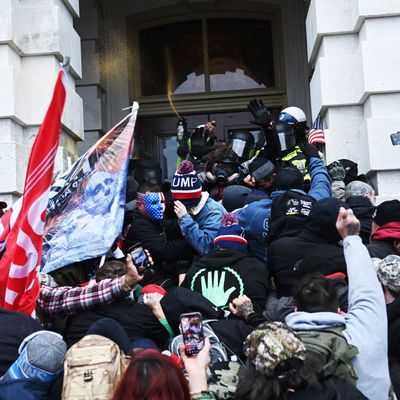
Tuesday was a major milestone for the Justice Department’s sprawling prosecution of the attack on the Capitol last year. After just a few hours of deliberation, a federal jury in Washington, D.C., handed down the first verdict in a trial stemming from the January 6 riot, convicting Guy Reffitt of Texas, who carried a firearm as a member of the mob and recorded himself saying, “I just want to see Nancy Pelosi’s head hit every fucking stair on the way out.”
To date, the department has charged nearly 800 people, and more than 200 of them have pleaded guilty, mostly to misdemeanor offenses, though last week the department secured a landmark guilty plea in the sedition case against 11 members of the Oath Keepers militia. The Reffitt case was the department’s first demonstration of its strategic and tactical approach to the January 6 trials, and the result should incentivize more defendants to plead out. As the Reffitt trial showed, however, it is far from clear how rational all of these defendants are, since Reffitt himself had no real defense to the charges against him.
The trial was a curious event, bogged down by pandemic protocols such as clear dividers and social distancing that put witnesses in the jury well and the jury in the gallery; a Trump-appointed judge and her occasionally odd handling of the proceedings; and the absence of any coherent defense. The centerpiece was the dramatic testimony of Reffitt’s 19-year-old son, Jackson, who had turned in his father to the authorities and ultimately doomed him by the time he concluded several hours of testimony on the witness stand, where he provided a captivating depiction of an extraordinary filial chasm that seemed to stand in for the broader national division that led to the events of January 6.
In an opening statement, one of the government’s two prosecutors previewed the onslaught of digital evidence that would be introduced over the course of the trial: Telegram chats between Reffitt and fellow members of a militia group called the Three Percenters, text messages between Reffitt and his family, surveillance video from the Capitol, video from a helmet-mounted GoPro camera Reffitt wore on January 6 that was later recovered from a hard drive found in his home when he was arrested, a recording of a Zoom call between Reffitt and the leader of the Texas Three Percenters (also recovered from Reffitt himself), and secret recordings Jackson had made of a conversation with his father in the days following the siege.
The defense offered a three-minute response that seemed perfunctory in the extreme and offered no coherent theme beyond suggesting that Reffitt — who had repeatedly described, in writing and in recordings, exactly what he would do on January 6 and, afterward, exactly what he had done — was simply “bragging” and that his words should not be taken literally. In another setting, this argument might have had some legs, but the sheer volume of Reffitt’s admissions made it ridiculous from the start.
The first day of testimony was a slog, featuring a Capitol police officer who told her story in fits and starts, narrating multiple angles of medium-distance video from that day, sometimes in seconds-long increments, in which Reffitt could be spotted in a bright-blue jacket at the front of a mob, egging people on. When the government managed to overcome audio and video problems, its presentation was stilted and oddly lacking in the dramatic potency one would expect. (There is a whole private-sector industry of trial-graphics specialists whose job is to help litigators compile and present evidence for juries, but as far as I could tell, the government opted to keep this work in house, and it showed.) By the end of that first day, Judge Dabney Friedrich was already complaining about how the trial had gone on longer than she had expected. At different points, she questioned the accuracy of the time stamps on the surveillance video (which were immaterial to the case); chastised the government for asking repetitive questions, even though, as far as I saw, they were not particularly repetitive; and complained about the government’s suggesting to her in the middle of a witness’s testimony that it might be a good time to take a break — an utterly routine feature of trial practice.
The pace picked up considerably thereafter, and the government wrapped up its case after two and a half more days of testimony. Another member of the Three Percenters testified against Reffitt after receiving immunity from prosecutors and described traveling to Washington with the defendant. “We talked about the need for corrupt people to be removed and replaced by people who were not corrupt,” the witness said, though he claimed the most incendiary comments he and Reffitt made had been in jest. Crucially, he testified that Reffitt had his handgun on him at the Capitol. (None of the police officers who testified had seen it, since Reffitt carried it in a holster under his jacket and never brandished it, but FBI agents recovered both the gun and the holster when they arrested him, and there was corroborating photographic evidence from the riot.) Other law-enforcement agents filled in discrete but significant pieces of evidence — including the chaos that was unfolding within the Capitol, the search of Reffitt’s home, and the forensic examination of the digital devices seized from Reffitt that yielded some of the most important pieces of evidence against him.
The totality of that digital evidence was damning in itself. Immediately after Election Day 2020, Reffitt wrote in a group text to his family, “Congress has made fatal mistakes this time” and “This isn’t about Trump, its much, much bigger. This is about OUR country.” His own GoPro video from January 6, which was shot at the Ellipse before the storming of the Capitol, is replete with incriminating admissions. “I didn’t come here to play games. I’m taking the Capitol with everybody fucking else,” Reffitt said at one point. He also said that “Pelosi’s coming out,” that he would be “dragging that bitch out hard-core,” and that “I’m packing heat, and I’m going to get more heat.” In a Telegram chat with fellow Three Percenters recounting the day’s events, Reffitt wrote, “We took the Capital of the Untied [sic] States of America. What have you done today?” He said he had had “to fall back due to pepper spray to the face” and “was the lead up the Capital stairs.” “I’m not trying to be arrogant, but nobody was moving forward until I took that banister,” Reffitt later said on the Zoom call with the head of the Texas Three Percenters. “I just kept yelling, ‘Go forward! Go forward! Take the House!’”
By far the most heavily anticipated witness was Reffitt’s son, Jackson, who provided several riveting hours of testimony. Jackson took the stand in a shirt and jacket with no tie, his wavy brown hair, which he had apparently straightened for the proceeding, hanging down to his shoulders. He was chewing gum until one of the prosecutors extracted it from him during a brief break and was so soft-spoken he repeatedly had to be re-mic’d and told by the judge to speak up because everyone was having a hard time hearing him. Jackson was apologetic and unfailingly polite. As he began testifying, his father quietly broke down in tears.
Jackson testified about how, in late 2020, he had become increasingly concerned about his father’s claims of corruption in the federal government and his vague, self-described “constitutionalist” rhetoric about a popular uprising — views Jackson vaguely ascribed to his father spending more time on the internet than usual. After the election, he said, things got worse: His father wrote to the family at one point that something was going to happen that would “shock the world.” By Christmas Eve, Jackson said, “my paranoia pretty much blew over,” and he used his cell phone that night to provide a tip about his father to the FBI through the bureau’s website. He described being “nervous” and feeling both “gross” and “guilty” about it. “I didn’t know what I was doing,” he said.
Jackson and the rest of the family learned Reffitt had gone to the Capitol on January 6 on the day itself, when they spotted him in the crowd on television. Jackson said he was “terrified,” “sad,” and “scared” by what he saw, and only later that day did the FBI get back to him in response to the tip he had given weeks earlier. He later met with an agent at a local restaurant and, unbeknownst to his family, began providing information against his father while still living at home. One day, as Reffitt was proudly showing his GoPro video to his family and narrating the events, Jackson decided to download an app on his phone and record him. On that tape, Reffitt says, among other things, that he “did bring a weapon” and that “they’re lucky we didn’t shoot them.” Jackson said he “felt pretty gross” recording his father.
Later, Jackson explained, his father told him and his younger sister, “If you turn me in, you’re a traitor, and you know what happens to traitors: Traitors get shot.” This formed the crux of the government’s obstruction-of-justice charge against Reffitt — a clear effort to dissuade his children from turning him in — even if it was clear that he was being deliberately hyperbolic. There was no evidence Reffitt had ever abused anyone in the family or that Jackson was seriously worried about his or his sister’s physical safety.
Jackson was not at home when FBI agents showed up to arrest his father just weeks later — he learned about the raid through a call from his mother — and afterward, he moved out. His father has been in custody since the arrest, and the family did not know Jackson had turned in his father until he gave an interview to CNN’s Chris Cuomo several days later, in which Jackson, still clearly grappling with the reality of what he had done, described what had led him to that decision while repeatedly saying he still loved his father. He testified that, after the interview, his relationship with his mother and two sisters became strained and that they rarely speak, but they have all stressed in interviews that they still love one another. “When we do talk,” Jackson said quietly on the stand, “it’s nice.”
At one point during cross-examination, Reffitt’s lawyer suggested Jackson might have been motivated to turn on his father for money. Jackson testified that a GoFundMe account he had set up after the CNN interview to fund his education at community college had generated about $158,000. (Since his testimony, that number has continued to climb.) The effort by Reffitt’s lawyer fell flat, in part because it was nonsensical to believe Jackson could have predicted the full array of consequences, much less any financial benefits that might accrue to him, when he provided his tip to the FBI on Christmas Eve. It also seemed clear to anyone watching that Jackson was motivated by sincerely held concerns about his father’s behavior.
Toward the end of his testimony, Jackson said he does not regret his decision to turn in his father, “but it’s a lot.” “I don’t have words to really describe it,” he explained, his voice again difficult to hear. “I think this is the best-case scenario.”
Trials offer an often elusive promise of clarity about why people do the unfortunate things they do. Reffitt’s case was unusual in that the basic who, what, and when questions the jury needed to decide — Was that Reffitt in the blue jacket in the videos from the Capitol? Did he bring a gun to the siege? — were either uncontested or easily resolved by the copious, contemporaneous digital evidence the investigators had skillfully amassed.
In many cases, however, and in Reffitt’s, too, we want to know what drove the defendants, a question that can expose the sometimes tricky distinction between intent and motive in the law. In a financial-fraud case, for instance, the government typically needs to prove the defendant intended to obtain money or property from a third party; establishing the motive for doing so can be extremely helpful in understanding the facts, but it is, strictly speaking, not necessary in the ordinary case.
As a practical matter, the most important thing the government needed to establish in Reffitt’s case was that he had intended to obstruct Congress on January 6, but the government largely avoided discussing the psychological and ideological radicalization Reffitt clearly had undergone in the years leading up to and through 2020 that had led him to the Capitol that day. Even after the trial, it wasn’t entirely clear what his plan had been — what it was he intended to do, what exactly he hoped to achieve, and what role Trump’s incendiary rhetoric and the constellation of political, media, and paramilitary sympathizers had played in Reffitt’s actions, which he does not seem to regret. Ultimately, he appeared to be a lumbering, if still quite dangerous, dimwit.
The opacity of Reffitt’s psychology appears to have reflected a strategic decision on the government’s part to try to avoid overt political and ideological discussions that might have inflamed some jurors or the public. It was the correct strategic decision, but it means that any hope for fully understanding Reffitt himself has gone largely unrealized. Despite all the simultaneously self-pitying and self-important pretrial talk of being a “1/6 political prisoner” being pursued for “Orwellian thought crimes,” Reffitt exercised his right not to testify in his defense, despite this being easily his most valuable opportunity to present his views directly to the public and in a largely costless way, at that, since his odds of beating the case at trial were slim at best.
One thing that seems clear is that Reffitt legitimately believed he was subordinating his personal self-interest for a larger political cause, however hazily defined it might have been in his own mind and however solipsistic it was in reality. This was the case even if, from the outside, it is easy to see that these violent right-wing forces had been nurtured for years by the narcissism and unscrupulousness of Trump and his more sophisticated supporters.
In a superficial sense, Reffitt’s son did something similar by placing his safety, the stability of his family, and the liberty of his own father on the line because he was worried about the danger his father might pose to others and to our country. In the end, Jackson was the one who made the sacrifice for his country in a truly stunning act of patriotism for which he may never be able to fully forgive himself. The two men, father and son — one large and dangerous, the other slight and reserved; one unrepentant, the other wracked by guilt — seem to perfectly complement each other and to embody an elemental distinction between selfishness and selflessness.
In an ideal world, Guy Reffitt would, at some point, find a way to be very proud of his son.






























